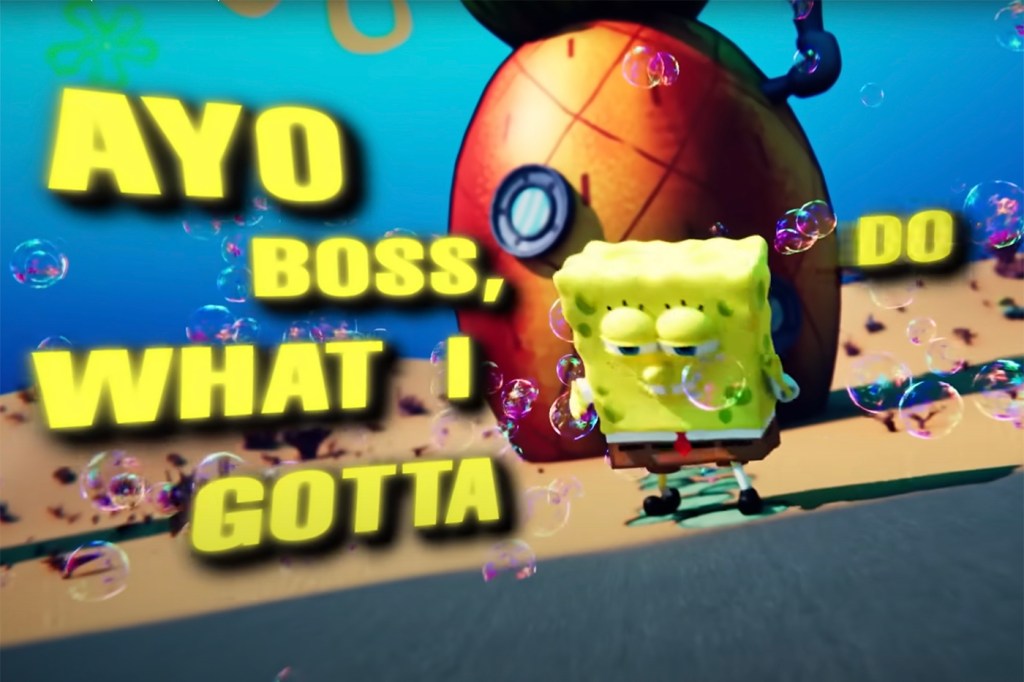Glorb is hitting it big with AI-generated SpongeBob raps. But is it legal under copyright law?
AI-generated music poses a completely new, increasingly complicated set of legal questions about the nature of creative work, a Northeastern legal expert says.

SpongeBob SquarePants, the famous character from Nickelodeon’s cartoon series, is known for a lot of things. There’s his laugh, high-pitched voice, optimism and, of course, his square pants. But did you know he can also rap?
Under the name Glorb, an anonymous artist has been releasing songs featuring SpongeBob and his friends rapping about guns and drugs, using what appears to be artificial intelligence. Glorb is far from the first artist to make a name for themselves using AI-generated music and the voices of other artists. But as the technology becomes more advanced and accessible, the Glorbs of the world start to raise ethical and legal questions about how these new technologies square with the rights of artists, creatives and companies, says Alexandra Roberts, a professor of law and media at Northeastern University.
“The whole set of questions that has come up with generative AI is a new set of questions,” Roberts says. “It’s very complicated to figure out how copyright law as it exists today applies to these kinds of uses, both for the training and the output, which is why we have a couple of different cases going on, why we have a lot of speculation and why we have people trying things out and, in particular, trying things out anonymously.”
Some artists, like Paul McCartney, have found creative uses for AI, but many more are increasingly concerned about what this technology means for their work and are asking many of these questions already. But the core of the increasingly complicated legal discussion around generative AI is one question: Is this legal?
The answer, like the questions raised by AI, is still up in the air.
“Sometimes when we see something happening, we say, ‘OK, no one has stopped them yet. That must mean that it’s OK.’ It doesn’t necessarily mean that,” Roberts says. “There are certainly arguments to be made that these songs are copyright infringement.”
Is the training model for the AI being used infringing on copyright law, as the New York Times is claiming in its case against OpenAI and Microsoft? Even if it doesn’t, Roberts says a work created using an AI model could violate copyright law in its own way.
Featured Posts
“There are questions about the purpose and nature of the use and the impact on the market that are probably more closely tied to the output than to the training,” Roberts says. “It’s also possible for the generative AI to violate the terms of service for the source material that it accesses. Depending on where this artist is getting access to all of these recordings of the SpongeBob show, there may be issues there.”
In copyright law, the goal is to figure out if a work is derivative of other copyrighted works. If it’s been changed or transformed enough, then it might not necessarily violate the law, but that’s determined on a case-by-case basis, Roberts says.
When it comes to music, Roberts admits this whole issue gets tricky because artists constantly sample or draw inspiration from other artists. But Glorb’s music presents a different legal issue: characters protected under copyright. Creatives and companies can copyright their characters as long as they meet certain standards. In some ways, it’s easier for them to do this than with the work of actual human artists.
If Paramount Global decided to pursue legal action against Glorb, Roberts says that could make for an even stronger case. Northeastern Global News reached out to Paramount Global for comment but did not receive a response in time for publication.
“Whatever company would be the plaintiff would be pretty well able to show not only the protectability of the individual episodes that are audio-visual works but some of the prominent characters that folks recognize taken out of context,” Roberts says.
Roberts is more confident in a legal argument being made against Glorb on copyright, but she says it’s hard to predict whether this kind of new music-making fits under fair use because, typically, fair use is a defense in copyright cases and each case is highly specific. But there are certain aspects of Glorb’s music that could make for a challenging case in court.
“The very fact that they’re streaming and making money off of these uses is not going to be helpful to them in a fair use analysis,” Roberts says.
Part of the challenge with AI is that it’s still so new, and there is no legal precedent yet since major cases like the New York Times’ lawsuit against OpenAI haven’t been decided. Meanwhile, lawmakers in Tennessee have taken more proactive steps to protect the rights of artists through the ELVIS Act.
As more and more cases are brought against AI-generated creations, these legal questions will only become more prominent. As valuable as those questions are for artists, Roberts hopes the value of fair use and what it’s supposed to protect is not lost along the way.
“If we have inadequate protection or the fair use defense narrows too much, it chills speech, it chills creativity, people can’t do new or interesting or experimental kinds of projects,” Roberts says. “I want to make sure to highlight the importance of maintaining that sphere, enabling fan art and responses and the kinds of derivative work that have traditionally been allowed under that doctrine. We want to avoid a reaction that is outsized and that treats everything as infringing.”











